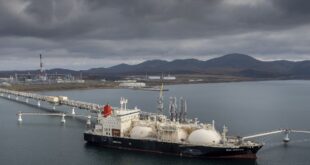Germany’s economic downturn deepens with a projected contraction in 2024, marking its second consecutive year of decline. Manufacturing struggles and global competition, especially from China, highlight structural issues. Growth is expected to return in 2025.
Germany’s economic woes are continuing, with the country now facing the spectre of closing 2024 in recession.
On Wednesday, German Economy Minister Robert Habeck announced that the economy is expected to shrink by 0.2% this year, down from earlier forecasts of a 0.3% growth and marking the second consecutive year of contraction.
This bleak outlook makes Germany the only G7 economy projected to contract in 2024, a continuation of its 0.3% decline in 2023.
The downturn reflects the country’s prolonged structural challenges, including reliance on its manufacturing sector and the adverse effects of global competition, particularly from China.
Hope for recovery in 2025
Despite the gloomy near-term outlook, the German government predicts that the economy will return to growth in 2025, with the gross domestic product expected to increase by 1.1%, slightly up from the earlier forecast of 1.0%. By 2026, growth could reach 1.6%, driven primarily by an upturn in private consumption and stabilising inflation.
These projections, however, are contingent on the successful implementation of structural reforms and the stabilisation of global economic conditions.
According to Habeck, the implementation of a comprehensive growth package of 49 measures is crucial. These measures aim to revitalise the economy by fostering investment, enhancing productivity, and addressing long-standing structural issues.
Habeck stressed that if this plan is successfully enacted, “the economy will be stronger, and more people will come back to work,” but its success hinges on the support of both houses of parliament, including the opposition-controlled Bundesrat.
On the inflation front, the government has revised its projections.
Inflation is expected to fall to 2.2% in 2024 from 5.9% last year, with further reductions anticipated in the following years, stabilising at 1.9% by 2026.
These falling inflation rates, alongside wage increases and tax relief, are seen as pivotal in reviving private consumption, which could drive modest economic growth in 2025.
Structural challenges persist
Germany’s economic struggles are compounded by bleaker projections from the ifo Institute, which has emphasised that the nation’s economy is “stuck in crisis.” According to the institute, both cyclical and structural factors are weighing heavily on Germany’s growth prospects.
“The German economy is stuck and languishing in the doldrums, while other countries are feeling the upswing,” said Prof. Dr. Timo Wollmershäuser, deputy director at the ifo Institute.
He attributes the malaise to a combination of factors, including decarbonisation, digitalisation, demographic shifts, and geopolitical upheavals such as the energy price shock and China’s changing role in the global economy.
Germany’s industrial base has been severely impacted over an extended period, suggesting the downturn is rooted in structural issues rather than merely reflecting a temporary cyclical slowdown.
The Manufacturing Purchasing Managers’ Index (PMI) plummeted to 40.6 in September 2024, the 27th consecutive month of contraction, ranking as the second-worst globally after Myanmar.
This long-running slump, particularly in export orders, is unprecedented in recent decades.
Dr. Cyrus de la Rubia, chief economist at Hamburg Commercial Bank, highlighted the so-called “China shock” as a key factor, noting that sectors such as automotive and mechanical engineering have struggled to adapt to heightened competition from abroad.
Corporate takeovers and strategic sales on the horizon
Amid these challenges, German companies are increasingly turning to foreign buyers to weather the storm or becoming appealing targets for takeovers.
Deutsche Bahn, Germany’s national railway operator, recently agreed to sell its logistics subsidiary Schenker to Danish rival DSV for approximately €14bn. This influx of cash is expected to provide much-needed financial relief to Deutsche Bahn, which has been struggling with operational inefficiencies and frequent delays.
At the same time, Commerzbank, Germany’s second-largest private lender, is a prime target for a foreign takeover. UniCredit, the Italian banking giant, has discreetly increased its stake in Commerzbank to 21%, raising speculation that a hostile takeover could be on the horizon.
ECB President Christine Lagarde has spoken in favour of cross-border banking mergers, arguing that European banks need to consolidate to compete effectively on the global stage.
Meanwhile, some German companies are shifting their investments abroad. BASF, the chemical industry giant, is building a new factory in China worth €10bn, underscoring the increasing trend of companies turning to international markets to secure growth.
Mid-sized energy service provider Techem was also recently sold by its Swiss owners to US asset manager TPG, reflecting a broader pattern of foreign acquisitions in the German market.
 topnaijanews Stay informed with the latest Nigerian news at your fingertips
topnaijanews Stay informed with the latest Nigerian news at your fingertips
